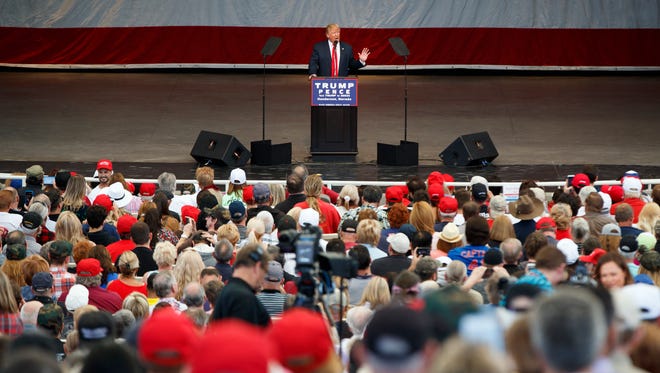Trump, Latino candidates could energize Latino voters in Nevada this year
LAS VEGAS — The Republican Party’s presidential candidate refers to Mexicans as rapists and wants to build a wall along the entire southern border.

The Democratic candidate for Senate in Nevada is Catherine Cortez Masto, a Latina whose grandfather came to the U.S. from Chihuahua, Mexico. And a Democratic House candidate is Ruben Kihuen, who came to the U.S. at age 8 from Guadalajara, Mexico.
The stage couldn’t be better set for the state’s Hispanic voters to once and for all flex their power at the polls.
“We’ve been trying to figure out for years what will motivate Hispanic turnout,” said Fred Lokken, political science professor at Truckee Meadows Community College in Reno. “This could be the first election that brings a large number of Hispanic voters to the Nevada polls.”
Numbers show potential impact
In 2015, there were 813,391 Hispanics in Nevada — 28.1% of the population, according to the Census Bureau. Only New Mexico, Texas, California, Arizona and Florida had a greater percentage of Hispanics, the Pew Research Center reports. In addition, Census figures show that since the 2012 presidential election, Nevada's Hispanic population has grown an estimated 8.5% compared to the state's overall population increase of 4.9%.
Still, according to an analysis led by David Damore, political scientist at the University of Nevada, Las Vegas, just more than half of Latinos in the state eligible to vote actually cast ballots in the 2008 and 2012 presidential elections.
According to the U.S. Election Project, total turnout in Nevada was 57% of the eligible population in 2008 and 56.4% in 2012, compared with 52% turnout just for Hispanics.
Get-out-the-vote efforts are trying to change that.

Last week, crowded into a bare room in a nondescript Las Vegas office building, a small army of more than 50 canvassers got marching orders on how to boost Latino turnout numbers and turn the presidential and Senate races in Nevada in favor of Democrats.
This particular effort, paid for by the Immigrant Voters Win Political Action Committee, has been going on since August. Now working six days a week, the canvassers have knocked on 120,000 doors, said Francisco Morales, state director for Center for Community Change Action.
About 10 canvassers are doing the same work in the Reno area, with similar efforts ongoing in Colorado and Florida.
It’s a sophisticated, high-tech enterprise. Each canvasser gets a computer tablet loaded with the names and addresses of Latinos and Asians who are potential voters. When the canvassers go to their neighborhoods, supervisors can track their movements because each tablet is equipped with GPS.
The information gathered on site is automatically entered into a master file. People are urged to fill out pledge cards vowing to vote. The cards will be mailed back to them and workers will follow up to make sure they do vote. A mass texting system, successfully used by the Bernie Sanders' campaign, will also be used.
Groups come together for historic effort
“This is definitely historic,” Morales said. And costly. According to filings with the Federal Election Commission, about $2 million has been spent by the Immigrant Voters Win PAC on this work just in the Senate campaign between Cortez Masto and GOP candidate Rep. Joe Heck.
But it’s just one component of the Latino registration and get-out-the-vote effort in the state.
Besides Morales’ Center for Community Change Action, three other groups — Nevada’s Voice, the Culinary Workers Union Local 226, and PLAN (Progressive Leadership Alliance of Nevada) Action Fund — are doing their own work under a coalition called the Immigrant Voter Project.
By Election Day, these groups hope to knock on more than 900,000 doors in Nevada to promote registration and turnout.
Hispanic vote will reach record high in 2016
Maria Landeros has cleaned rooms at the MGM Grand in Las Vegas for 23 years.
But since this summer, she and dozens of the 57,000-member Culinary Workers Union have been on a leave of absence.
She reports each day to the union hall and — after orientation — heads out with tablet computer in hand to canvass potential Latino voters.
“I don’t miss to clean rooms,” she says with a sly smile.
Landeros says a lot of the people she encounters are aware of Republican presidential candidate Donald Trump’s comments about Latinos. “They have a lot of feelings against him,” she said.
She cast her first ballot for Barack Obama in 2012 and says she understands why many Latinos — even those registered — don’t vote.
To an outsider, the whole process can seem confusing, she said. Plus, new voters can feel like they don’t have enough information about the candidates.

Why Latinos don’t vote
Eric Herzik, political scientist at the University of Nevada, Reno, said the simple lack of history of voting can be the biggest impediment to crossing into the voting booth for the first time.
“They are a little shy about voting,” said Herzik. He added lower income and education levels and the fact that Nevada Latinos are relatively young all contribute to lower turnout.
A November 2012 Census Bureau survey found that the top reason cited by Hispanics for not voting was being too busy or having a scheduling conflict (23%), followed by a lack of interest (15%) and illness or disability (11.5%).
That may be changing. A national tracking poll of Latino registered voters released Monday by Latino Decisions, a public opinion research firm, found that 51% of those surveyed were more enthusiastic about voting this year — 11 percentage points higher than at the same time in 2012. In addition, 83% said it was “very important” to vote this year.
Still, Lokken the political scientist said the fundamental questions remain: “Who is going to show up on Election Day? Exactly how motivated are Nevada voters?”